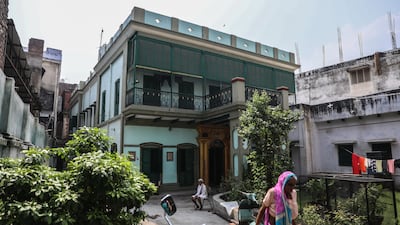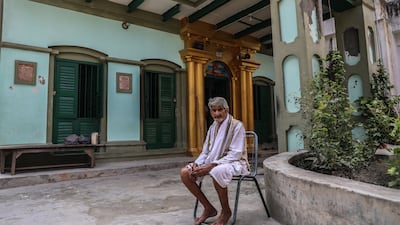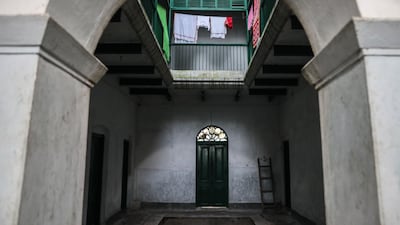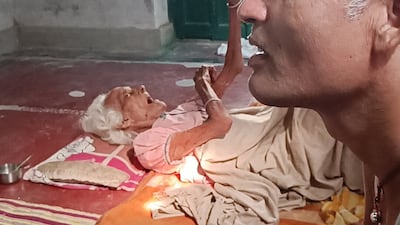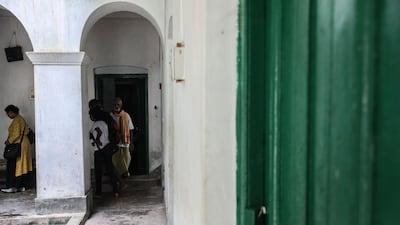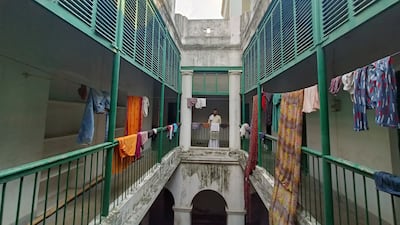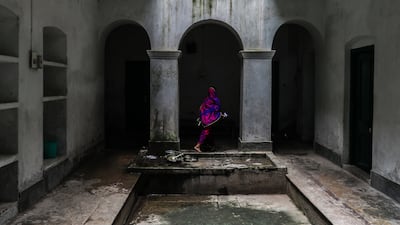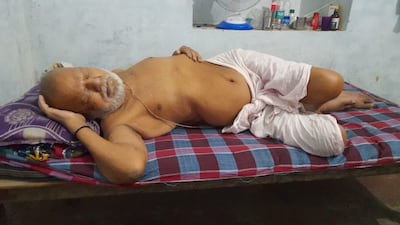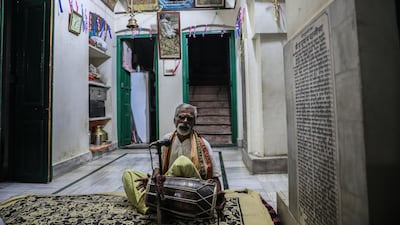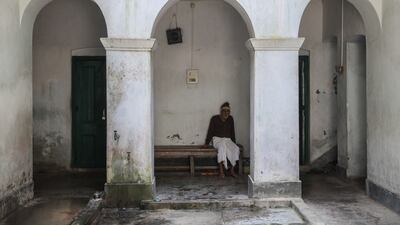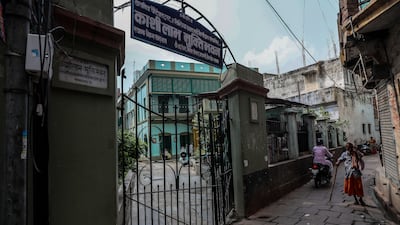As the loud humming sound of the fans reverberates inside the sticky room, 95-year-old Premvati Gupta moves her bony limbs intermittently as her grandson feeds her holy water from the Ganges river.
There are no medical devices or life-saving drugs to resuscitate her from her deathbed in the largely bare room at the Kashi Labh Mukti Bhawan hotel. Instead, her grandson prays.
“We pray she dies here,” Rajnish Gupta, 45, Ms Gupta’s grandson said with a smile.
Such an outrageous wish is not unusual for the occupants of the unique “death hotel”, which is located on the banks of the Ganges in India’s Varanasi. Hindus believe the city is sacred and those who die here achieve salvation from the cycle of birth and death.
“It would be best if she finally finds freedom from this pain … she wanted to die here for salvation and it may sound rude but we want that too for her mukti [meaning freedom],” he told The National.
Ms Gupta, a devout Hindu who has three sons and four grandchildren, was brought to Mukti Dham nearly two weeks ago from a village in central Madhya Pradesh, some 600 kilometres away, after doctors gave up hopes for any improvement.
She stopped eating weeks ago after being bedridden for more than 15 years. She makes occasional whimpers as she survives on a few spoons of water every hour.
Her eyes are closed and her toothless mouth hangs open.
Varanasi, one of the world's oldest continually inhabited cities, has a special place in Hinduism and is considered the abode of the deity Lord Shiva — with droves of faithful coming to the city to take their last breath or families bringing their dead relatives for the last journey to attain moksha, or salvation.
Hindus believe that after death, the soul transmigrates and is reincarnated in a new body — depending on one’s deeds or karma — and are reborn as humans in the best cases or animals or plants in the worst.
But those who die in Varanasi are freed from the cycle as the soul attains completeness and enters a state of eternal bliss.
Believers like Ms Gupta camp in the city for weeks for the sake of attaining salvation and arrive at the doors of Kashi Labh Mukti Bhawan, India’s “death hotel”.
India's death hotel

Tucked away in the winding lanes of the bustling city, the Kashi Labh Mukti Bhawan is a charity-run home that offers a haven to elderly people or those who are terminally ill. It welcomes them to spend their last days in Varanasi and have their ashes scattered in the Ganges.
The two-storey building with 10 large but squalid rooms was constructed in 1908. It was converted into a hospice by Jaid Dayal Dalmia, a leading industrialist, and philanthropist in 1958.
The home has since received nearly 15,000, more than 90 per cent of whom died and “attained salvation”, Anurag Shukla, the building's manager, said.
Each “beneficiary” is allowed a two-week stay, with a grace period of a week in certain cases, to take the opportunity to breathe their last breath.
They pay a paltry fee of rupees 20 ($0.24) a day to cover electricity costs and the rest is taken care of by the Dalmia Trust.
The shelter is open to people from all religious backgrounds and there are no advanced bookings. It doesn’t accept donations either, despite taking care of the expenses for all the rituals and cremation.
Mukti Bhawan's manager
“It is not a hotel. We get calls from people from across the country, even foreigners who want to book a room in advance but we are not here for the money. Our doors are only open on an availability basis,” Mr Shukla, told The National.
The shelter receives some 300 people a year and has four employees including a priest, who looks after the spiritual well-being of the “beneficiaries”.
No medicine or methods are used to catalyse death and people have to wait for the end of their life. If they don’t die within the stipulated time, they are politely asked to leave — and some have returned to their homes hale and hearty.
At least two family members must stay with each dying person.
The shelter provides them with basic facilities like a bed, furnishing, cooking gas and some utensils.
Prayers and hymns of verses from Gita and Ramayana — the Hindu scriptures are sung at regular intervals for spiritual enlightenment by Kalikant Dubey, the priest, who claims to correctly predict the fate of the “beneficiaries” before providing them with a room.
“After meeting such people, I can sense how bad the person’s condition is and how badly they need the place here. I try to give them comfort spiritually by singing hymns and prayers to them,” Mr Dubey said.
The bizarre concept might prove hair-raising to many, but the atmosphere at the home is far from sombre.
The family members — as well as the staff at the home — say they cherish their stay and celebrate the “end” of their loved one’s life.
Rohit Kumar Jha, 29, a lawyer from eastern Bihar state, brought his 97-year-old grandfather Chaturbhuj Jha, to the hospice in June.
His father had died a few months earlier, leaving his grandfather devastated.
“My father died before his eyes. My grandfather was heartbroken after his death and suffered a heart attack. He repeatedly asked us to take him there as he wanted freedom from the pain of human life,” Mr Jha told The National.
“This place gave him that chance to die peacefully,” he said.
Mr Shukla, whose father ran the management of the shelter for over four decades before his death, said he sees the unusual home as a social service to help people “attain salvation”.
“We see death as a celebration. We don’t feel sad if a person dies here because we see it as only an end of the human life and soul getting salvation.”
“There are times when the death of an elderly at the hospice is even celebrated with a music band,” Mr Shukla said.
